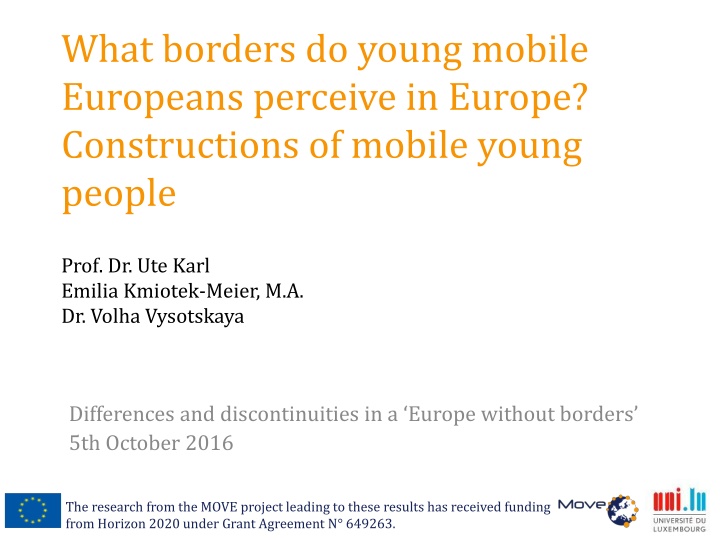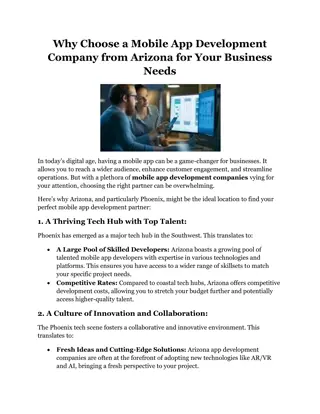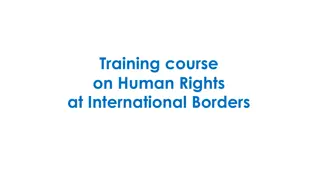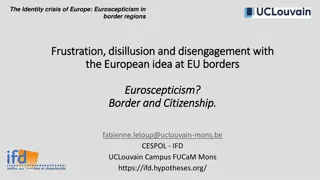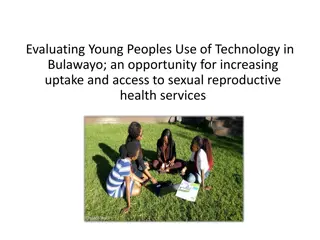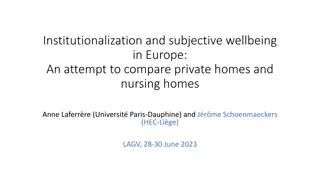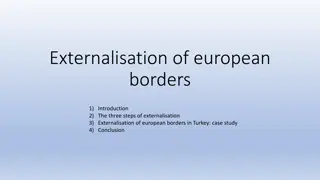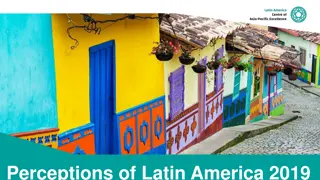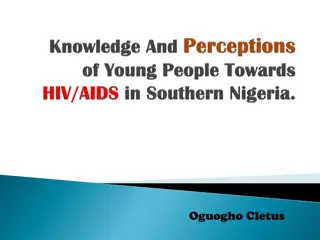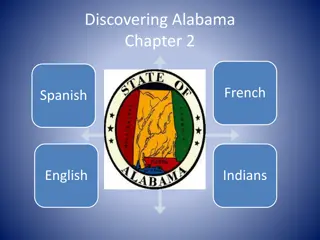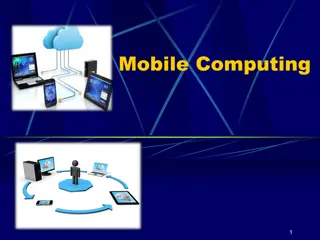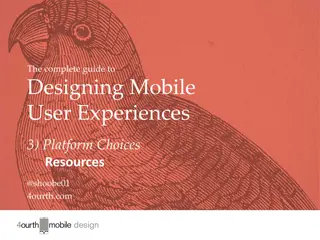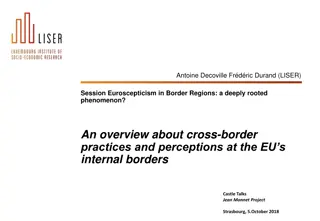Perceptions of Borders Among Young Mobile Europeans in Europe
This research delves into the perceptions of borders by young mobile Europeans within Europe, exploring how these constructs impact their daily lives. The study investigates the concept of a borderless Europe facilitated by the EU's free movement of persons policy, shedding light on differences and discontinuities that exist despite the absence of physical borders. Through the MOVE project, Prof. Dr. Ute Karl, Emilia Kmiotek-Meier, M.A., and Dr. Volha Vysotskaya examine the experiences of young individuals navigating employment and student mobility, shedding light on the invisible but impactful borders present in their lives.
Download Presentation

Please find below an Image/Link to download the presentation.
The content on the website is provided AS IS for your information and personal use only. It may not be sold, licensed, or shared on other websites without obtaining consent from the author.If you encounter any issues during the download, it is possible that the publisher has removed the file from their server.
You are allowed to download the files provided on this website for personal or commercial use, subject to the condition that they are used lawfully. All files are the property of their respective owners.
The content on the website is provided AS IS for your information and personal use only. It may not be sold, licensed, or shared on other websites without obtaining consent from the author.
E N D
Presentation Transcript
What borders do young mobile Europeans perceive in Europe? Constructions of mobile young people Prof. Dr. Ute Karl Emilia Kmiotek-Meier, M.A. Dr. Volha Vysotskaya Differences and discontinuities in a Europe without borders 5th October 2016 The research from the MOVE project leading to these results has received funding from Horizon 2020 under Grant Agreement N 649263.
Overview I. II. III. Sample IV. Findings V. Discussion EU discourse Theoretical frame 2
Borderless Europe The free movement of persons is a fundamental right guaranteed by the EU to its citizens. It entitles every EU citizen to travel, work and live in any EU country without special formalities. (EU, Migration and Home Affairs) 3
EU as one? ? 5
Theoretical frame borders that gives order to our lives, but not dominantly physical or geographical constructs often invisible, but impact on the daily lives (Newman, 2006) processes of othering -> the other is constructed through practices and in difference to what is taken as the normality or sameness from a dominant position (Kessl & Maurer, 2010) 6
Sample Age: 18 29 Stage of mobility: during or shortly after (up to 18 months) Field: Luxembourg criterion employment mobility criterion student mobility direction incoming 10 direction incoming 2 outgoing 1 outgoing 10 gender female 5 gender female 7 male 6 male 5 length of stay 1-12 M 9 type of stay credit 6 above 12 M 3 degree 6 type of job (highly) skilled 10 time after stay during 3 unskilled 1 1-12 M 5 ALL 11 above 12 M 4 7 ALL 12
Expertise as entrance card to a country and the lack thereof (I) So we came here, in the beginning was phoo, I would say very hard to find anything, because Luxembourgish market is very close I would say and you know, you have to speak four languages fluently, you have to speak French, German, Luxembourgish, blablablablabla, and English is nothing, really! (Ewa, from Poland, employment mobility) 8
Expertise as entrance card to a country and the lack thereof (II) My impression is that Luxembourg is lacking workforce, and Professional qualifications, so they are at least in the sector I am working, they are intensively advertising and recruiting abroad, people, so they actively seek to look for us to come to Luxembourg. (Thomas, from Belgium, employment mobility) 9
Entrance to the country recognition of diploma (I) I got the placement but I decided for Luxembourg instead, because I thought that it would be easier with the recognition afterwards( ). Because nobody could tell me, if this from Germany would be recognised and I didn t want to approach this problem after my study. (Henriette, from Luxembourg, student mobility) 10
Entrance to the country recognition of diploma (I) In my study programme we have a lot of praxis ( ) if I do it in Luxembourg, than I do it in a country where I will work in the future, it is the professional system I will work in later on. For me it makes much more sense to do my internships here. (Diana, from Luxembourg, student mobility) 11
Differentation (I) As I said, culture, language, I think that all played a big role that I felt better in [town B, Germany] (than in Belgium EKM). (Esther, from Luxembourg, student mobility) This life, (Germany EKM) is our neighboring country ( ) but still I have noticed that the mentality of the people is different. I cannot explain it, I cannot give any example, but I have noticed that things are different, that people do think differently. (Henriette, from Luxembourg, student mobility) 12
Differentation (II) But the culture, the culture, I was saying always that they're very similar to German in my opinion, to German people, because you know, they are quiet, they are not so open like Italians, they are not so crazy like Italians or something. They're very ehm yeah German I would say. They have their own home, it's their castle and they feel well there. (Ewa, from Poland, employment mobility) 13
Differentation (III) So I have many Luxembourgish colleagues. I mean they are ok. But just they hang out with other Luxembourgers, like on Saturday night, Friday night they do not ask you to hang out with them. (Leonardo, from Italy, employment mobility) 14
Conclusion Perceived borders along national state borders: labour markets educational pathways -> to fit (national) labour markets language Differences between the two types of mobility student mobility and employment mobility other phases of life -> different: transitions / decisions / going abroad Borders change situation scope of action relationalities 15
Discussion / Outlook Our presentation -> borders along national state borders Other borders constructions possible along supra-national dimensions e.g. being a mobile person vs. being a migrant 16
References Antonsich, Marco (2008). The Narration of Europe in National and Post- National Terms. European Journal of Social Theory, 11(4), 505 522. EU, Migration and Home Affairs: http://ec.europa.eu/dgs/home-affairs/what- we-do/policies/borders-and-visas/schengen/index_en.htm Kessl, Fabian & Maurer, Susanne (2010). Praktiken der Differenzierung als Praktiken der Grenzbearbeitung. berlegugen zur Bestimmung Sozialer Arbeit als Grenzbearbeiterin. In: Kessl, Fabian & Pl er, Melanie (Hrsg.), Differenzierung, Normalisierung, Andersheit. Soziale Arbeit als Arbeit mit den Anderen. Wiesbaden: Verlag f r Sozialwissenschaftn, S. 154 169. Newman, David (2006). Borders and Bordering: Towards an Interdisciplinary Dialogue. European Journal of Social Theory, 9(2), 171 186. 17
Thank you for your attention! Prof. Dr. Ute Karl Emilia Kmiotek-Meier, M.A. Dr. Volha Vysotskaya ute.karl@uni.lu emilia.kmiotek@uni.lu volha.vysotskaya@uni.lu University of Luxembourg Facult des Lettres, des Sciences Humaines, des Arts et des Sciences de l'Education Institute for Research and Innovation in Social Work, Social Pedagogy and Social Welfare (IRISS) http://www.move-project.eu The research from the MOVE project leading to these results has received funding from Horizon 2020 under Grant Agreement N 649263. 18
